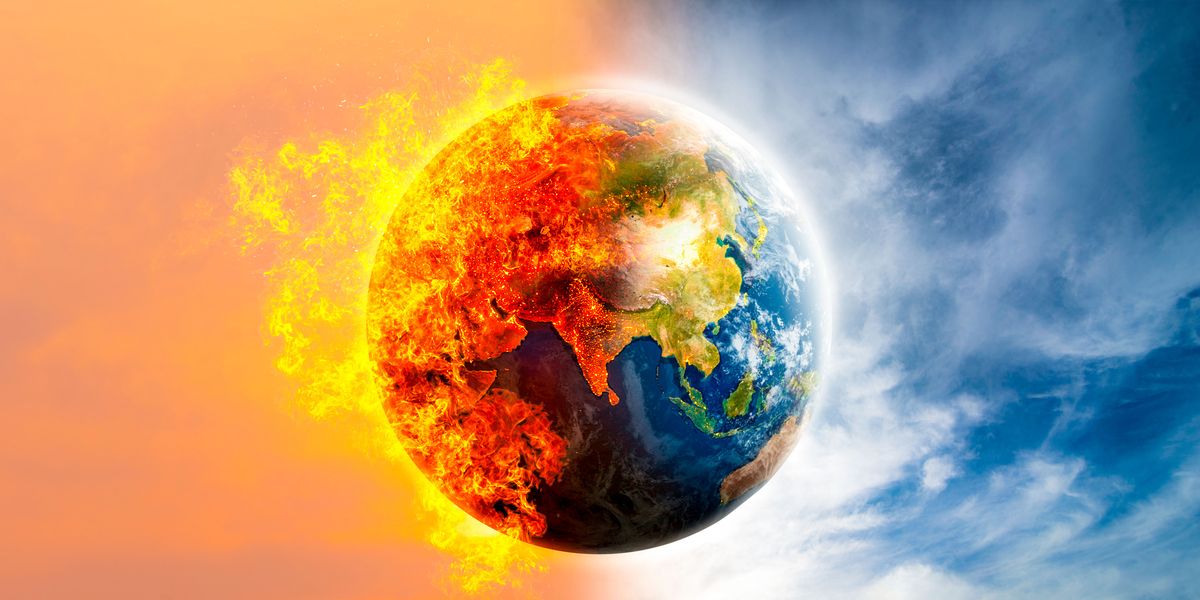
Clues have emerged that reveal a much hotter history than we thought.
- The Paris Climate Accords in 2015 set an ambitious (and necessary) goal of keeping global temperatures at 1.5 degrees Celsius above pre-industrial temps. But a new study says we might’ve blown past that threshold several years ago.
- A new study from University Western Australia Oceans Institute studied long-lived Caribbean sclerosponges and created an ocean temperature timeline dating back to the 1700s.
- While the study claims that we surpassed 1.5 degrees Celsius in 2020, other scientists question if data from just one part of the world is enough to capture the immense thermal complexity of our oceans.
Whatever your stance is on climate change (it’s real, let’s move on), it’s impossible to have missed the near-ubiquitous call to action to “keep temperatures from exceeding 1.5 degrees Celsius compared to pre-industrial levels.” Over the past few years, the somewhat bureaucratic phrase has become a rallying cry for the climate conscious.
This ambitious target first surfaced following the Paris Climate Agreement, and describes a sort of climate threshold—if we pass a long-term average increase in temperature of 1.5 degrees Celsius, and hold at those levels for several years, we’re going to do some serious damage to ourselves and our environment.
Well, a new paper from the University Western Australia Oceans Institute has some bad news: the world might’ve blown past that threshold four years ago. Published in the journal Nature Climate Change, the paper reaches this conclusion via an unlikely route—analyzing six sclerosponges, a kind of sea sponge that clings to underwater caves in the ocean. These sponges are commonly studied by climate scientists and are referred to as “natural archives” because they grow so slowly. Like, a-fraction-of-a-millimeter-a-year slow. This essentially allows them to lock away climate data in their limestone skeletons, not entirely unlike tree rings or ice cores.
By analyzing strontium to calcium ratios in these sponges, the team could effectively calculate water temperatures dating back to 1700. The sponges watery home in the Caribbean is also a plus, as major ocean currents don’t muck up or distort temperature readings. This data could be particularly useful,as direct human measurement of sea temperature only dates back to roughly 1850, when sailors dipped buckets into the ocean. That”s why the Intergovernmental Panel on Climate Change (IPCC) uses 1850 and 1900 as its preindustrial baseline, according to the website Grist.
“The big picture is that the global warming clock for emissions reductions to minimize the risk of dangerous climate change has been brought forward by at least a decade,” Malcolm McCulloch, lead author of the study, told the Associated Press. “Basically, time’s running out.”
The study concludes that the world started warming roughly 80 years before the IPCC’s estimates, and that we already surpassed 1.7 degrees Celsius in 2020. That’s a big “woah, if true” moment, but some scientists are skeptical. One such scientist, speaking with LiveScience, said that “ it begs credulity to claim that the instrumental record is wrong based on paleosponges from one region of the world… It honestly doesn’t make any sense to me.” Other experts expressed wanting to see more data before completely upending the IPCC’s climate goalposts, which say the Earth is currently hovering at a long-term temperature change of around 1.2 degrees Celsius.
Unfortunately, even if the sponges are wrong, there’s mounting evidence that we are in the process of crossing that 1.5 degree threshold as we speak. This January was the hottest on record, clocking in at 1.7 degrees above pre-industrial temperatures. According to New Scientist, that means we’ve been above 1.5 degrees of change for at least a year. That doesn’t jump the long-term average over the 1.5-line, but it’s certainly a sign we’re getting close fast.
Regardless of the percentage, one thing is certain—climate change is an all-hands-on-deck crisis. In order to save the planet for future habitability, humans need to curtail emissions immediately—after all, the sea sponges are telling us so.
The 2023 Popular Mechanics Automotive Excellence Awards: EVs
News Related-
Russian court extends detention of Wall Street Journal reporter Gershkovich until end of January
-
Russian court extends detention of Wall Street Journal reporter Evan Gershkovich, arrested on espionage charges
-
Israel's economy recovered from previous wars with Hamas, but this one might go longer, hit harder
-
Stock market today: Asian shares mixed ahead of US consumer confidence and price data
-
EXCLUSIVE: ‘Sister Wives' star Christine Brown says her kids' happy marriages inspired her leave Kody Brown
-
NBA fans roast Clippers for losing to Nuggets without Jokic, Murray, Gordon
-
Panthers-Senators brawl ends in 10-minute penalty for all players on ice
-
CNBC Daily Open: Is record Black Friday sales spike a false dawn?
-
Freed Israeli hostage describes deteriorating conditions while being held by Hamas
-
High stakes and glitz mark the vote in Paris for the 2030 World Expo host
-
Biden’s unworkable nursing rule will harm seniors
-
Jalen Hurts: We did what we needed to do when it mattered the most
-
LeBron James takes NBA all-time minutes lead in career-worst loss
-
Vikings' Kevin O'Connell to evaluate Josh Dobbs, path forward at QB
